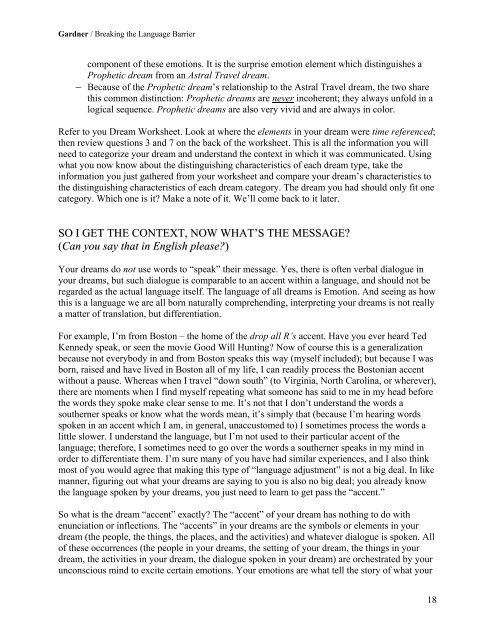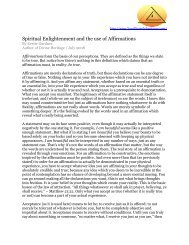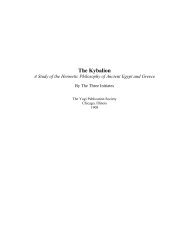Breaking the Language Barrier: Learning to Interpret Your Dreams
Breaking the Language Barrier: Learning to Interpret Your Dreams
Breaking the Language Barrier: Learning to Interpret Your Dreams
Create successful ePaper yourself
Turn your PDF publications into a flip-book with our unique Google optimized e-Paper software.
Gardner / <strong>Breaking</strong> <strong>the</strong> <strong>Language</strong> <strong>Barrier</strong><br />
component of <strong>the</strong>se emotions. It is <strong>the</strong> surprise emotion element which distinguishes a<br />
Prophetic dream from an Astral Travel dream.<br />
− Because of <strong>the</strong> Prophetic dream’s relationship <strong>to</strong> <strong>the</strong> Astral Travel dream, <strong>the</strong> two share<br />
this common distinction: Prophetic dreams are never incoherent; <strong>the</strong>y always unfold in a<br />
logical sequence. Prophetic dreams are also very vivid and are always in color.<br />
Refer <strong>to</strong> you Dream Worksheet. Look at where <strong>the</strong> elements in your dream were time referenced;<br />
<strong>the</strong>n review questions 3 and 7 on <strong>the</strong> back of <strong>the</strong> worksheet. This is all <strong>the</strong> information you will<br />
need <strong>to</strong> categorize your dream and understand <strong>the</strong> context in which it was communicated. Using<br />
what you now know about <strong>the</strong> distinguishing characteristics of each dream type, take <strong>the</strong><br />
information you just ga<strong>the</strong>red from your worksheet and compare your dream’s characteristics <strong>to</strong><br />
<strong>the</strong> distinguishing characteristics of each dream category. The dream you had should only fit one<br />
category. Which one is it Make a note of it. We’ll come back <strong>to</strong> it later.<br />
SO I GET THE CONTEXT, NOW WHAT’S THE MESSAGE<br />
(Can you say that in English please)<br />
<strong>Your</strong> dreams do not use words <strong>to</strong> “speak” <strong>the</strong>ir message. Yes, <strong>the</strong>re is often verbal dialogue in<br />
your dreams, but such dialogue is comparable <strong>to</strong> an accent within a language, and should not be<br />
regarded as <strong>the</strong> actual language itself. The language of all dreams is Emotion. And seeing as how<br />
this is a language we are all born naturally comprehending, interpreting your dreams is not really<br />
a matter of translation, but differentiation.<br />
For example, I’m from Bos<strong>to</strong>n – <strong>the</strong> home of <strong>the</strong> drop all R’s accent. Have you ever heard Ted<br />
Kennedy speak, or seen <strong>the</strong> movie Good Will Hunting Now of course this is a generalization<br />
because not everybody in and from Bos<strong>to</strong>n speaks this way (myself included); but because I was<br />
born, raised and have lived in Bos<strong>to</strong>n all of my life, I can readily process <strong>the</strong> Bos<strong>to</strong>nian accent<br />
without a pause. Whereas when I travel “down south” (<strong>to</strong> Virginia, North Carolina, or wherever),<br />
<strong>the</strong>re are moments when I find myself repeating what someone has said <strong>to</strong> me in my head before<br />
<strong>the</strong> words <strong>the</strong>y spoke make clear sense <strong>to</strong> me. It’s not that I don’t understand <strong>the</strong> words a<br />
sou<strong>the</strong>rner speaks or know what <strong>the</strong> words mean, it’s simply that (because I’m hearing words<br />
spoken in an accent which I am, in general, unaccus<strong>to</strong>med <strong>to</strong>) I sometimes process <strong>the</strong> words a<br />
little slower. I understand <strong>the</strong> language, but I’m not used <strong>to</strong> <strong>the</strong>ir particular accent of <strong>the</strong><br />
language; <strong>the</strong>refore, I sometimes need <strong>to</strong> go over <strong>the</strong> words a sou<strong>the</strong>rner speaks in my mind in<br />
order <strong>to</strong> differentiate <strong>the</strong>m. I’m sure many of you have had similar experiences, and I also think<br />
most of you would agree that making this type of “language adjustment” is not a big deal. In like<br />
manner, figuring out what your dreams are saying <strong>to</strong> you is also no big deal; you already know<br />
<strong>the</strong> language spoken by your dreams, you just need <strong>to</strong> learn <strong>to</strong> get pass <strong>the</strong> “accent.”<br />
So what is <strong>the</strong> dream “accent” exactly The “accent” of your dream has nothing <strong>to</strong> do with<br />
enunciation or inflections. The “accents” in your dreams are <strong>the</strong> symbols or elements in your<br />
dream (<strong>the</strong> people, <strong>the</strong> things, <strong>the</strong> places, and <strong>the</strong> activities) and whatever dialogue is spoken. All<br />
of <strong>the</strong>se occurrences (<strong>the</strong> people in your dreams, <strong>the</strong> setting of your dream, <strong>the</strong> things in your<br />
dream, <strong>the</strong> activities in your dream, <strong>the</strong> dialogue spoken in your dream) are orchestrated by your<br />
unconscious mind <strong>to</strong> excite certain emotions. <strong>Your</strong> emotions are what tell <strong>the</strong> s<strong>to</strong>ry of what your<br />
18






